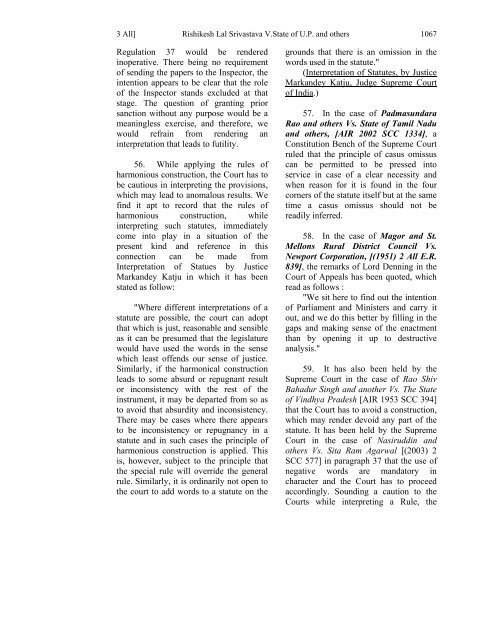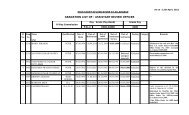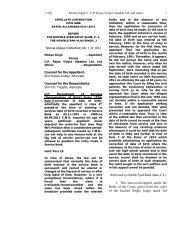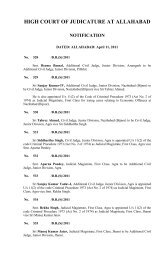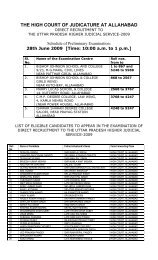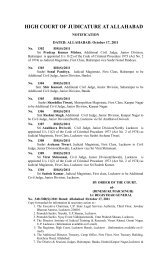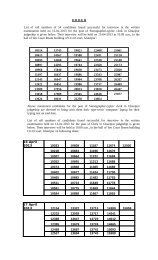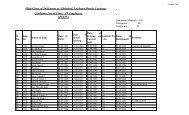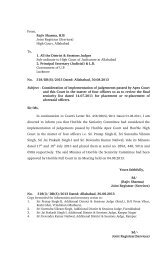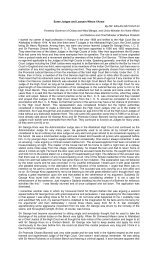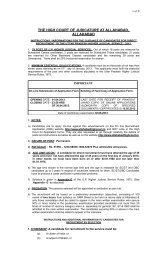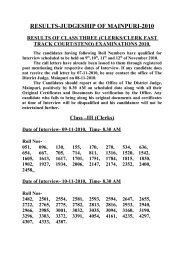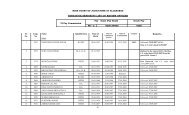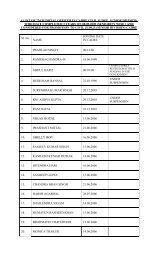Nov - High Court of Judicature at Allahabad
Nov - High Court of Judicature at Allahabad
Nov - High Court of Judicature at Allahabad
Create successful ePaper yourself
Turn your PDF publications into a flip-book with our unique Google optimized e-Paper software.
3 All] Rishikesh Lal Srivastava V.St<strong>at</strong>e <strong>of</strong> U.P. and others 1067<br />
Regul<strong>at</strong>ion 37 would be rendered<br />
inoper<strong>at</strong>ive. There being no requirement<br />
<strong>of</strong> sending the papers to the Inspector, the<br />
intention appears to be clear th<strong>at</strong> the role<br />
<strong>of</strong> the Inspector stands excluded <strong>at</strong> th<strong>at</strong><br />
stage. The question <strong>of</strong> granting prior<br />
sanction without any purpose would be a<br />
meaningless exercise, and therefore, we<br />
would refrain from rendering an<br />
interpret<strong>at</strong>ion th<strong>at</strong> leads to futility.<br />
56. While applying the rules <strong>of</strong><br />
harmonious construction, the <strong>Court</strong> has to<br />
be cautious in interpreting the provisions,<br />
which may lead to anomalous results. We<br />
find it apt to record th<strong>at</strong> the rules <strong>of</strong><br />
harmonious construction, while<br />
interpreting such st<strong>at</strong>utes, immedi<strong>at</strong>ely<br />
come into play in a situ<strong>at</strong>ion <strong>of</strong> the<br />
present kind and reference in this<br />
connection can be made from<br />
Interpret<strong>at</strong>ion <strong>of</strong> St<strong>at</strong>ues by Justice<br />
Markandey K<strong>at</strong>ju in which it has been<br />
st<strong>at</strong>ed as follow:<br />
"Where different interpret<strong>at</strong>ions <strong>of</strong> a<br />
st<strong>at</strong>ute are possible, the court can adopt<br />
th<strong>at</strong> which is just, reasonable and sensible<br />
as it can be presumed th<strong>at</strong> the legisl<strong>at</strong>ure<br />
would have used the words in the sense<br />
which least <strong>of</strong>fends our sense <strong>of</strong> justice.<br />
Similarly, if the harmonical construction<br />
leads to some absurd or repugnant result<br />
or inconsistency with the rest <strong>of</strong> the<br />
instrument, it may be departed from so as<br />
to avoid th<strong>at</strong> absurdity and inconsistency.<br />
There may be cases where there appears<br />
to be inconsistency or repugnancy in a<br />
st<strong>at</strong>ute and in such cases the principle <strong>of</strong><br />
harmonious construction is applied. This<br />
is, however, subject to the principle th<strong>at</strong><br />
the special rule will override the general<br />
rule. Similarly, it is ordinarily not open to<br />
the court to add words to a st<strong>at</strong>ute on the<br />
grounds th<strong>at</strong> there is an omission in the<br />
words used in the st<strong>at</strong>ute."<br />
(Interpret<strong>at</strong>ion <strong>of</strong> St<strong>at</strong>utes, by Justice<br />
Markandey K<strong>at</strong>ju, Judge Supreme <strong>Court</strong><br />
<strong>of</strong> India.)<br />
57. In the case <strong>of</strong> Padmasundara<br />
Rao and others Vs. St<strong>at</strong>e <strong>of</strong> Tamil Nadu<br />
and others, [AIR 2002 SCC 1334], a<br />
Constitution Bench <strong>of</strong> the Supreme <strong>Court</strong><br />
ruled th<strong>at</strong> the principle <strong>of</strong> casus omissus<br />
can be permitted to be pressed into<br />
service in case <strong>of</strong> a clear necessity and<br />
when reason for it is found in the four<br />
corners <strong>of</strong> the st<strong>at</strong>ute itself but <strong>at</strong> the same<br />
time a casus omissus should not be<br />
readily inferred.<br />
58. In the case <strong>of</strong> Magor and St.<br />
Mellons Rural District Council Vs.<br />
Newport Corpor<strong>at</strong>ion, [(1951) 2 All E.R.<br />
839], the remarks <strong>of</strong> Lord Denning in the<br />
<strong>Court</strong> <strong>of</strong> Appeals has been quoted, which<br />
read as follows :<br />
"We sit here to find out the intention<br />
<strong>of</strong> Parliament and Ministers and carry it<br />
out, and we do this better by filling in the<br />
gaps and making sense <strong>of</strong> the enactment<br />
than by opening it up to destructive<br />
analysis."<br />
59. It has also been held by the<br />
Supreme <strong>Court</strong> in the case <strong>of</strong> Rao Shiv<br />
Bahadur Singh and another Vs. The St<strong>at</strong>e<br />
<strong>of</strong> Vindhya Pradesh [AIR 1953 SCC 394]<br />
th<strong>at</strong> the <strong>Court</strong> has to avoid a construction,<br />
which may render devoid any part <strong>of</strong> the<br />
st<strong>at</strong>ute. It has been held by the Supreme<br />
<strong>Court</strong> in the case <strong>of</strong> Nasiruddin and<br />
others Vs. Sita Ram Agarwal [(2003) 2<br />
SCC 577] in paragraph 37 th<strong>at</strong> the use <strong>of</strong><br />
neg<strong>at</strong>ive words are mand<strong>at</strong>ory in<br />
character and the <strong>Court</strong> has to proceed<br />
accordingly. Sounding a caution to the<br />
<strong>Court</strong>s while interpreting a Rule, the


